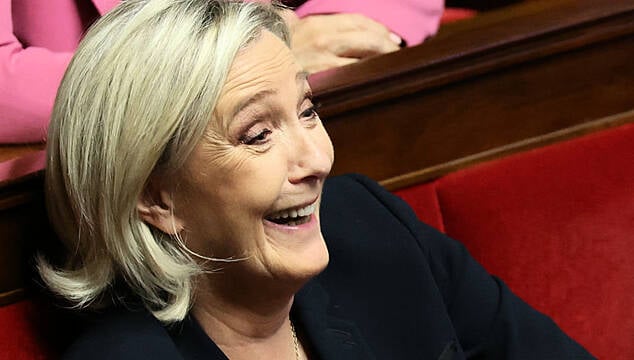French prime minister Michel Barnier faces a no-confidence vote on Wednesday that, if successful - as appears likely, barring any last-gasp turnaround - will leave France at risk of entering 2025 without a government or a budget.
If the vote passes, Mr Barnier, who has been in the job for less than three months, will have to tender his resignation and that of his government to president Emmanuel Macron, who ushered in the crisis by calling a snap election in June. Not since 1962 has a French government been brought down by a vote of no confidence. Here are some scenarios for what the next few weeks may bring:
Macron caves in to far-right demands on budget
Mr Macron's surest path to naming a new prime minister able to form a government and pass a budget before the end of the year is to acquiesce to the budget demands of Marine Le Pen's National Rally.
However, this would imply abandoning efforts to haul down France's gaping budget deficit from a projected 6.1 per cent this year to nearer 5 per cent in 2025.
A caretaker government rolls over 2024 budget provisions
Mr Barnier's government can stay on in a caretaker capacity to handle day-to-day business while Mr Macron tries to chart a path out of the mess. If parliament has not passed a budget by December 20th, the government can propose emergency legislation that would roll over spending limits and tax provisions from 2024, pending the installation of a new government and a new 2025 budget bill.
The €60 billion of savings through spending cuts and tax rises planned by the Barnier government - and welcomed by investors and ratings agencies - would then fall by the wayside. Ms Le Pen's party has said households would be better off in this scenario, something Mr Barnier's government denies. It says more people will end up paying tax or additional tax if thresholds cannot be adjusted for inflation.
Caretaker government uses executive order to pass budget
A government can also invoke constitutional powers to pass the 2025 budget by executive order if parliament has not approved it by December 20th.
However, that would be highly risky, jurists say, as it is unclear whether a caretaker government can use such powers. Doing so would inevitably trigger political turmoil.
What does it all mean for Macron?
The tumult that has followed Mr Macron's decision to call a snap election has diminished his standing at home and abroad.
Under the constitution, Mr Macron's term in office runs until the spring of 2027. Opponents on the hard left and far right have demanded he resign to take responsibility for the political mess.
As he lacks a majority in parliament, Mr Macron's opponents could shoot down one pick for prime minister after another.
Ms Le Pen says a government reshuffle stands little chance of long-term success, while a dissolution of parliament is constitutionally not possible before July, leaving only one option: Mr Macron steps down.
However, the constitution gives extensive powers to the president in crisis situations. He can call referendums and has the admittedly extreme possibility of invoking emergency "full powers" under Article 16, drafted by the founders of the Fifth Republic with wartime in mind.
The president has responded to demands to resign by pledging to fulfil his role "with all my energy, to the last second".







